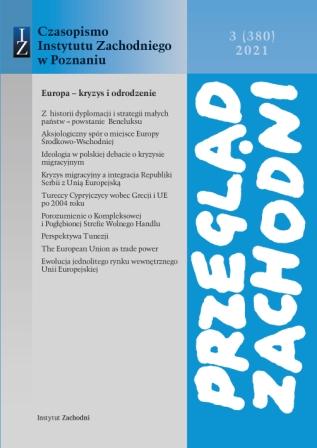Kontrowersje wokół negocjacji Porozumienia o Kompleksowej i Pogłębionej Strefie Wolnego Handlu. Perspektywa Tunezji
Controversy over the negotiations of the Deep and Comprehensive Free Trade Area Agreement. A Tunisian perspective
Author(s): Ewa Szczepankiewicz-RudzkaSubject(s): Governance, Recent History (1900 till today), International relations/trade, EU-Accession / EU-DEvelopment
Published by: Instytut Zachodni im. Zygmunta Wojciechowskiego
Keywords: European Union; Tunisia; free trade area;
Summary/Abstract: The Deep and Comprehensive Free Trade Area agreements (DCFTA) are an instrument for implementing the European Neighbourhood Policy adopted in 2004. Their main goal is to enhance a wider integration of the countries of the Southern and Eastern Partnership into the Community market in order to strengthen stability, security and prosperity of the associated countries. Thus, the DCFTA goes beyond the framework of the Association Agreements concluded in the 1990s. They offer broader cooperation beyond the Free Trade Area for industrial goods and promote regulatory harmonisation in areas that affect trade, especially sanitary and phytosanitary regulations, customs and border procedures, competition and public procurement regulations. Negotiations for an agreement with Tunisia began in 2016 and have not been concluded to this day. The proposed agreement raises a lot of controversy about both the scope and the negotiating practices of the stronger partner. Based on content analysis, including media discourse, systemic, economic and legal analysis, three research questions were formulated: (1) Is the adopted model of trade liberalisation in the form of a free trade area beneficial to the Tunisian economy in the long term?; (2) Are asymmetry and differentiation in approach – the solutions adopted in the DCFTA - individualistic tailor-made solutions that sufficiently protect the weaker Tunisian economy?; (3) Does the EU use pressure methods and cautious approach in negotiations to model relations with the countries around it? The answers to these questions will help to confirm the hypothesis that the DCFTA is an asymmetric free trade agreement whose model, projected results and adopted tactics do not serve the interests of Tunisia.
Journal: Przegląd Zachodni
- Issue Year: 380/2021
- Issue No: 03
- Page Range: 111-128
- Page Count: 18
- Language: Polish

